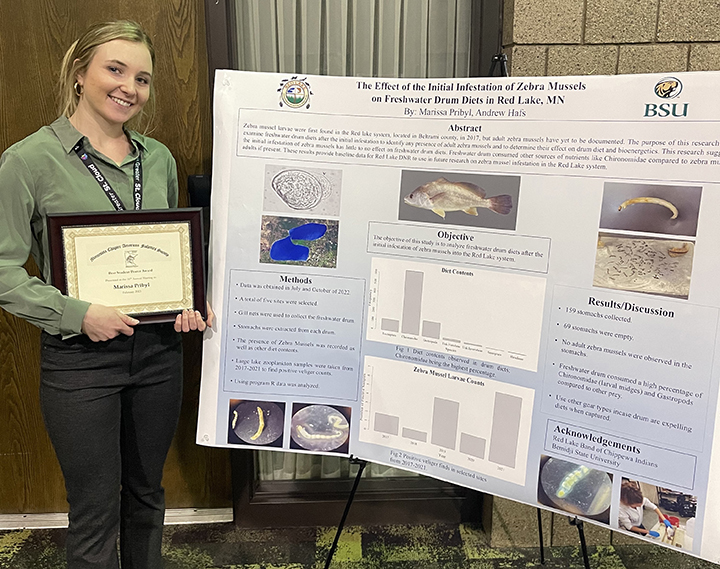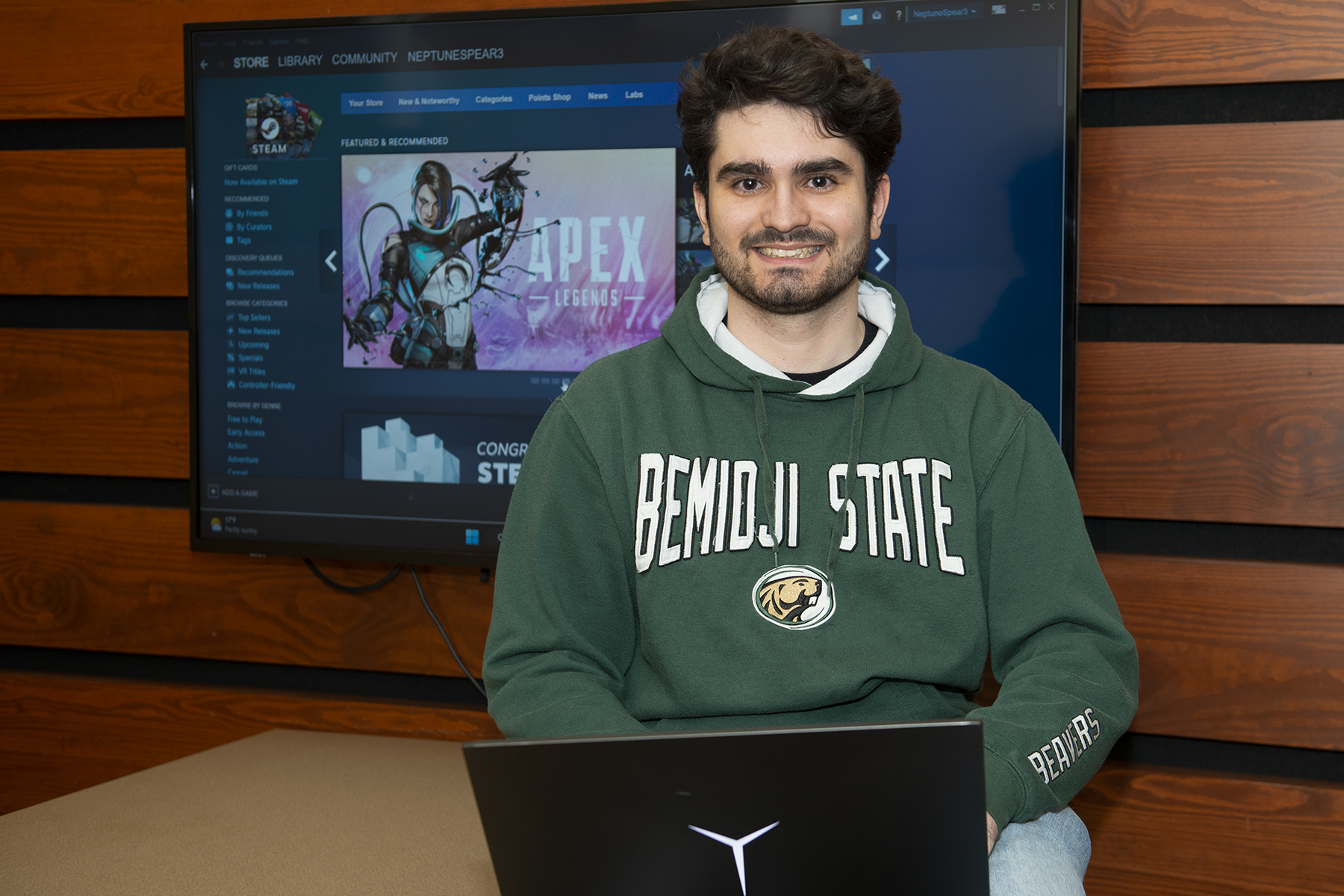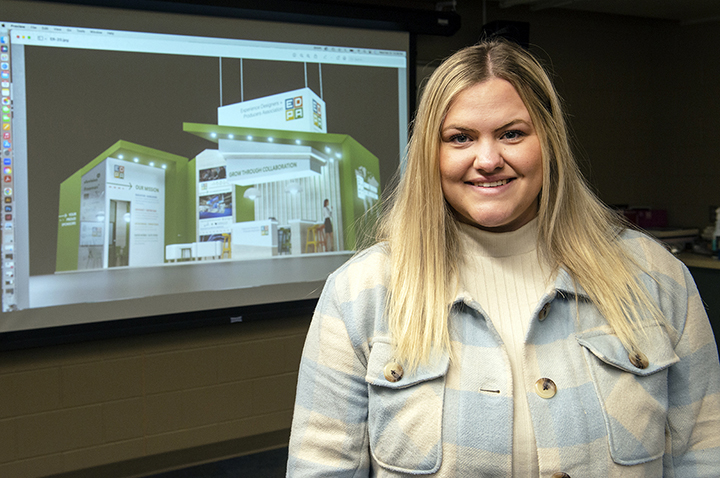Pribyl Seeks Answers About Red Lake’s Zebra Mussels
 Marissa Pribyl, a Bemidji State University aquatic and wildlife biology double-major, recently presented prize-winning research concerning a possible link between an understudied fish species and one of Minnesota’s most concerning aquatic invasive species.
Marissa Pribyl, a Bemidji State University aquatic and wildlife biology double-major, recently presented prize-winning research concerning a possible link between an understudied fish species and one of Minnesota’s most concerning aquatic invasive species.
Red Lake, Minnesota’s largest inland lake covering over 288,000 acres, has been infested with zebra mussel larvae since 2019. Populations of harmful adult zebra mussels are low, however, leaving many area fisheries researchers scratching their heads.
Much more common in Red Lake are freshwater drum, a fish species with blunt snouts, humped backs and males that grunt during breeding season to attract females. Their diets and habits remain relatively unstudied by the fisheries community, but it is known that they regularly feed on members of the mollusk family, which zebra mussels belong to.
Pribyl, who is from Bemidji, was determined to find out if the lake’s freshwater drum were keeping zebra mussel populations in check.
With help from Red Lake Nation’s Department of Natural Resources, she examined stomach contents of 159 freshwater drum for evidence the fish had been feeding on zebra mussels. Even though freshwater drum in other lakes are known to eat zebra mussels, Pribyl’s samples showed no evidence of it happening in Red Lake.
Pribyl entered her research into the student poster competition at the Minnesota Chapter of the American Fisheries Society’s annual meeting in January in St. Cloud. Despite strong competition from other student biologists, she won best student poster honors. She believes her research stood out to judges because freshwater drum are not frequently researched.
“It was a great feeling,” she said. “I was grinning ear-to-ear and couldn’t believe I won since there were many other great research projects there.”
Even though her initial research did not explain why there are so few adult zebra mussels in Red Lake (which is a good thing), Pribyl plans to continue her research by exploring other possible contributors.
“I plan to collect water chemistry data and compare the type of substrate (the material found on the lake bottom) between Upper and Lower Red Lake, which will hopefully give us a better understanding.”
After graduating in May, Pribyl headed to Alaska to research coho and cutthroat salmon as a fisheries technician. Applying to graduate school is also in the works for the budding fisheries researcher.
“I’m very appreciative for my time at BSU,” Pribyl said. “BSU will always have a special place in my heart.”
Vossen Explores Controversial Gaming Mechanic Outside the (Loot) Box
 Benjamin Vossen, a senior computer information systems student from Richmond, has been gaming most of his life. When he learned that it often costs $100 in real-world currency to receive specific virtual, in-game items through loot boxes in the popular online video game Apex Legends, it spurred an honors program capstone project and invitation to present at a Twin Cities computing and technology conference.
Benjamin Vossen, a senior computer information systems student from Richmond, has been gaming most of his life. When he learned that it often costs $100 in real-world currency to receive specific virtual, in-game items through loot boxes in the popular online video game Apex Legends, it spurred an honors program capstone project and invitation to present at a Twin Cities computing and technology conference.
Loot boxes are randomized rewards typically accessed by completing specific gameplay tasks or purchased with real-world currency. Loot boxes are often compared to gambling since players purchase the boxes in hopes of “winning” a unique item, with no guarantees of receiving it.
Vossen, who is a member of Bemidji State University’s Honors Program, decided to focus his senior capstone research project around the issues concerning loot boxes.
“I thought $100 was a huge sum of money to pay for an in-game item on a free-to-play game. I wanted to see how widespread and possibly harmful loot box systems in gaming currently are,” Vossen said.
Vossen’s paper, “Evaluating Ethics of Loot Boxes in Gaming,” examined two ethical issues surrounding the gameplay mechanic — underage gambling and gambling addiction.
“The research combines the two fields my degree encompasses, business and computer science,” Vossen said. “I’m leveraging the ethical points of view from a business perspective as well as a technological viewpoint allowing for my research to be more be more balanced and complete.”
Vossen used scholarly sources and news articles to examine current regulatory practices in gaming and demonstrate the financial and psychological consequences loot boxes can have on players. He also gave recommendations about how game developers could improve potentially unethical loot box systems.
Dr. Hamdan Alabsi, assistant professor of business administration and Vossen’s advisor, was impressed by his research and encouraged him to submit his findings to the Fourth Colloquium on Analytics, Data Science and Computing (CADSCOM) Conference, hosted by the Twin Cities Chapter of the Association of Computing Machinery, on Nov. 19 in Edina.
“I was happy when I saw people had chosen to attend my presentation. The audience was great and had very insightful questions and comments about my topic,” he said.
He appreciated the opportunity to share his research during the CADSCOM Conference.
“I was surprised about the attendance I had for my presentation. It’s a niche topic I didn’t know had such widespread interest,” Vossen said. “The ethical issues with loot boxes are often only known by the gamers who play the games, so I’m glad to see non-gamers looking into what practices are occurring.”
From Bemidji to Dusseldorf, Norgren Enjoys Bright Future in Exhibit Design

One of Bemidji State University Technology, Art & Design’s brightest stars, Anika Norgren earned a once-in- a-lifetime experience at Europe’s most influential exhibit design show after winning a prestigious student design competition.
The Annandale native submitted a trade exhibit mock-up in October for a student competition sponsored by the Experiential Design Producers Association, an organization representing more than 300 corporations and thousands of professionals in the exhibit and experience design industry.
The exhibit and experience design industry creates visual brand identities and interactive experiences for retail stores, trade shows, corporate office interiors and more. If you’ve ever been wowed by a booth at an entertainment conference or had your eye drawn to a unique product display in your favorite department store, you can credit the creativity of people like Norgren.
EDPA judges chose Norgren’s entry over nearly 40 other undergraduate and graduate submissions from universities across the country, punching Norgren’s ticket to Düsseldorf, Germany, to attend EuroShop 2023, Europe’s largest exhibit and retail design trade show.
Joined by five classmates and Dr. Sachel Josefson, associate professor of technology, art & design, Norgren took a lot away from her five days in Germany.
“The technology and lighting that was included in some exhibits really stood out to me,” Norgren said about the quality of the exhibits and the inspiration she gleaned from being a part of Europe’s premier show. “I have a fresh perspective on what experience design means and how I can apply that to my own work.”
Norgren said her eye-catching design has received many compliments from fellow students, faculty and industry professionals since winning the EDPA competition — affirmation that the time and effort put into her studies is not going to waste.
“Winning this competition means everything I’ve learned at BSU and in the industry has paid off,” Norgren, who was recently hired as a junior designer for an exhibit design firm in Brooklyn Park, said. “I look forward to working in this profession and this accomplishment has heightened my excitement for the future.”
With the continued support of School of Technology, Art & Design faculty and staff, Norgren feels ready to jump into the exhibit design world following graduation.
“BSU has provided me not only with a degree, but a prosperous future,” she said.
Stories by Eric Sorenson, Lily Bauer and BreAnnene Willson
